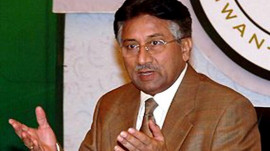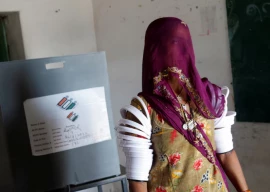
A large number of criminal cases are currently awaiting disposal at the Sindh High Court (SHC), allegedly due to the apathy of the defence or the prosecution, as well as a number of other factors. The delays in the disposal of these cases are one of the main reasons why criminals continue their activities undeterred, say experts.
"On each date of hearing, the lawyers either from the prosecution or the defence side appear and seek adjournment citing various reasons," remarked one of the clerks assisting a judge, who is assigned criminal cases. "Such excuses have added to the already burgeoning piles," he said, pointing towards the pile of criminal appeals and applications whose decomposing file covers are dotted with each date of hearing.
These appeals frequently move between the record rooms and courtrooms, as on almost every hearing, a new date is fixed following requests from the prosecution or defence.
According to statistics, around 1,531 criminal cases were pending before the SHC's principal seat at Karachi alone by the end of 2011. This number had increased to 2,777 by the end of March this year. This figure includes bail applications, criminal miscellaneous applications, review applications, appeals against imprisonment of up to seven years and above and references sent by the special anti-terrorism courts and the sessions' courts seeking confirmation of sentences awarded by them.
These cases include appeals filed by defendants belonging to banned militant, sectarian or ethnic outfits, who have challenged the sentences awarded to them many years ago. Around 241 appeals against punishments, including the death sentence and imprisonment exceeding the period of seven years, were pending disposal by the end of March, the statistics showed.
"The last couple of years have seen many lawyers being targeted on the basis of religious, ethnic or sectarian rivalries," a lawyer, who has been handling criminal cases against accused belonging to various ethnic groups, told The Express Tribune. As many as seven lawyers were killed in targeted attacks in the city in January 2012 alone. Police investigators and colleagues claimed that all of them were legal advisers to different sectarian outfits.
For his part, the Sindh High Court Bar Association (SHCBA) president, ZK Jatoi, blamed the shortage of judges as well as frequent calls for strike by lawyers for the delays in disposal of such cases. "Some of the slain lawyers were associated with particular political, sectarian or ethnic groups," he explained. "They probably abandoned the cases of one particular group when threatened by the other."
Role of the prosecution
The prosecution department plays a major role in criminal trials, which pass through different appellate stages such as the high court and the Supreme Court. The prosecution must ensure the criminal does not go scot-free.
Sher Muhammad Sheikh, who has recently taken up the charge of provincial prosecutor-general, said that none of the members of his prosecution team had complained of being harassed or threatened. Conversations with the state prosecutors, however, suggested that the situation was not ideal for them too.
"The prosecutors, especially those assisting the special anti-terrorism courts in trials relating to terrorism and sectarian or ethnic violence have always been pressurised and threatened," a prosecutor, who has been lucky to escape a string of attacks, told The Express Tribune.
Impact on law and order
Recently, the military, politicians, intelligence and law-enforcement agencies put their heads together to find a solution to the law and order situation in Karachi. They have decided to push the targeted operations into the final phase.
Legal experts are, however, skeptical of the plan, claiming that the success of the operation would be subject to the successful prosecution of the arrested criminals.
Criminologist and sociologist, Dr Fateh Muhammad Burfat, said that there are multiple factors to be blamed.
In the criminal justice system, the police, the courts and the prisons each have an important role to play in creating deterrence against anti-social activities in society. Unfortunately, none of the institutions is performing its duties up to the mark, he said.
Published in The Express Tribune, May 19th, 2014.




















-(1)1714116455-0/Heeramandireactions-(2)-(1)1714116455-0-270x192.webp)






1714024018-0/ModiLara-(1)1714024018-0-270x192.webp)









COMMENTS
Comments are moderated and generally will be posted if they are on-topic and not abusive.
For more information, please see our Comments FAQ